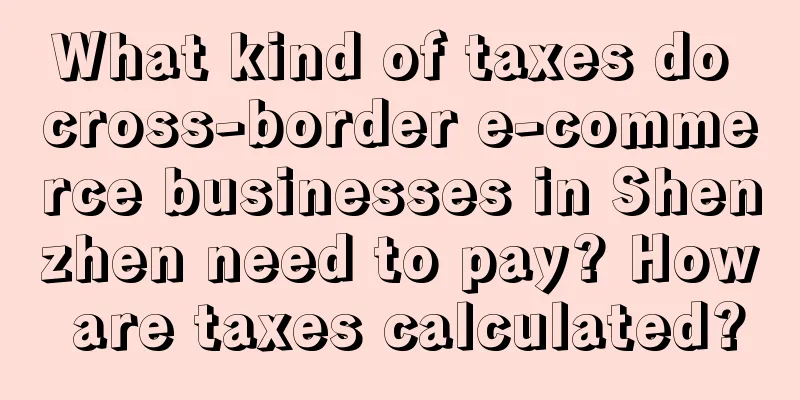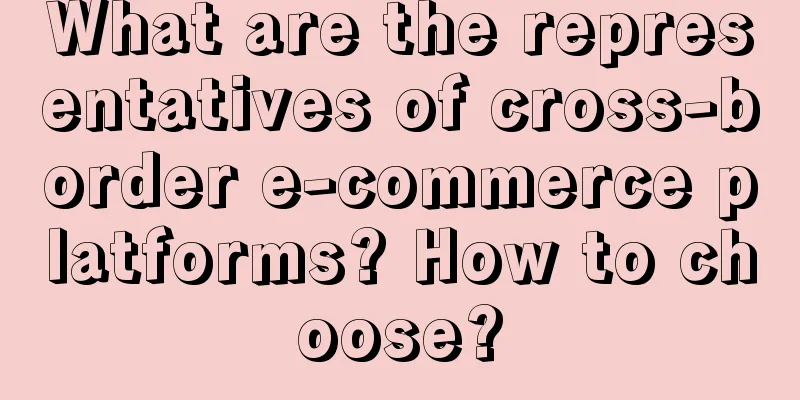What kind of taxes do cross-border e-commerce businesses in Shenzhen need to pay? How are taxes calculated?

|
With the rapid development of China's cross-border e-commerce industry, Shenzhen has become an important cross-border e-commerce center. For enterprises and self-employed individuals engaged in cross-border e-commerce in Shenzhen, it is very important to understand what kind of taxes need to be paid. This article will discuss the types of taxes that cross-border e-commerce in Shenzhen needs to pay and introduce how to calculate taxes. 1. What kind of tax does Shenzhen cross-border e-commerce need to pay? Value Added Tax (VAT): VAT is one of the main taxes that cross-border e-commerce in Shenzhen needs to pay. According to relevant policies, cross-border e-commerce export goods should enjoy tax exemption policies, but imported goods need to pay VAT in accordance with regulations. Tariffs: Tariffs are taxes that must be paid on imported goods, and they also apply to Shenzhen cross-border e-commerce. Tariff rates vary depending on the product category and country of origin. Consumption tax: For certain specific products, such as high-end cosmetics, luxury goods, etc., Shenzhen cross-border e-commerce also needs to pay consumption tax. Consumption tax is determined according to the category and price level of different products. Corporate income tax: For cross-border e-commerce companies registered in Shenzhen, according to the Corporate Income Tax Law, they need to pay corresponding corporate income tax based on their corporate profits. 2. How is tax calculated? VAT calculation: VAT calculation methods vary according to the business type and transaction method of Shenzhen cross-border e-commerce. Generally, the VAT amount to be paid is determined by verifying the transaction invoice and relevant supporting documents based on the specific circumstances of the exported and imported goods. Tariff calculation: Tariff calculation is based on the classification of imported goods and the country of origin. The amount of tariff payable can be calculated by checking the customs declaration form and relevant tariff. Consumption tax calculation: For specific commodities subject to consumption tax, the amount of consumption tax payable is calculated using the corresponding tax rate based on the category and price level of the commodities. Corporate income tax calculation: According to the Corporate Income Tax Law, cross-border e-commerce companies need to calculate and pay corporate income tax based on corporate profits and applicable tax rates. Enterprises and self-employed individuals engaged in cross-border e-commerce in Shenzhen need to understand and comply with relevant tax policies. The main taxes involved include value-added tax, customs duties, consumption tax and corporate income tax. By calculating taxes in compliance, enterprises and self-employed individuals can better avoid risks and lay the foundation for sustainable development. Recommended reading: Which platform should I choose for my personal cross-border e-commerce business? What are the requirements for entry? How much does it cost for personal cross-border e-commerce? Do I need a deposit? Can cross-border e-commerce personal trademarks be registered? What are the regulations? |
Recommend
A complete guide to the practical use of DMP for Xiaohongshu’s targeted audience
It turns out that Xiaohongshu has so many advertis...
From the perspective of Maotai’s 24 solar terms wine, where is the Xunfeng Yuan Universe heading?
Moutai joins hands with NetEase, what is the prosp...
Temu is busy overseas and has no time to care about domestic businesses
Temu, Pinduoduo's overseas e-commerce platform...
How to build a traffic-generating and customer-acquisition system for Xiaohongshu
This article analyzes the core strategies of Xiaoh...
Let’s talk about digital marketing for car companies
The overall sales growth rate of China's passe...
Looking at Double 11 from the list: What happened in the past three years?
Every time a big promotion ends, the rankings alwa...
What does a trade surplus mean? Is a trade surplus or a trade deficit better?
In foreign trade, if you do not understand the mea...
Charity marketing is not just about “donating, donating, donating”
Charity marketing aims to create a specific brand ...
What are the things to pay attention to when selling clothes in Shopee?
As one of the largest food delivery e-commerce pla...
Big sale marketing psychology - why do big sales use the promotion method of pre-sale + final payment?
In the context of e-commerce promotions, how can w...
Lei Jun gained 6.56 million followers in 40 days, and Xiaomi executives began to venture into Douyin
As the influence of social media grows, corporate ...
Flying towards the future, meeting new potential - Feilaihui appeared at the 2024 APEC SME Cross-border E-commerce Summit
On March 26, as an ecological partner of DHgate.co...
Some post-00s speculate in stocks, while others speculate in “Valley”
In this article, we will take a deep look at the e...
10,000 stores, hot products, marketing, 9.9, these are the four key words that helped Luckin Coffee surpass Starbucks
In 2023, Luckin Coffee's annual revenue surpas...
How do I remove a product from the wish list? How long does it take for a product to be put back on the shelf?
As a world-renowned e-commerce platform, Wish prov...









